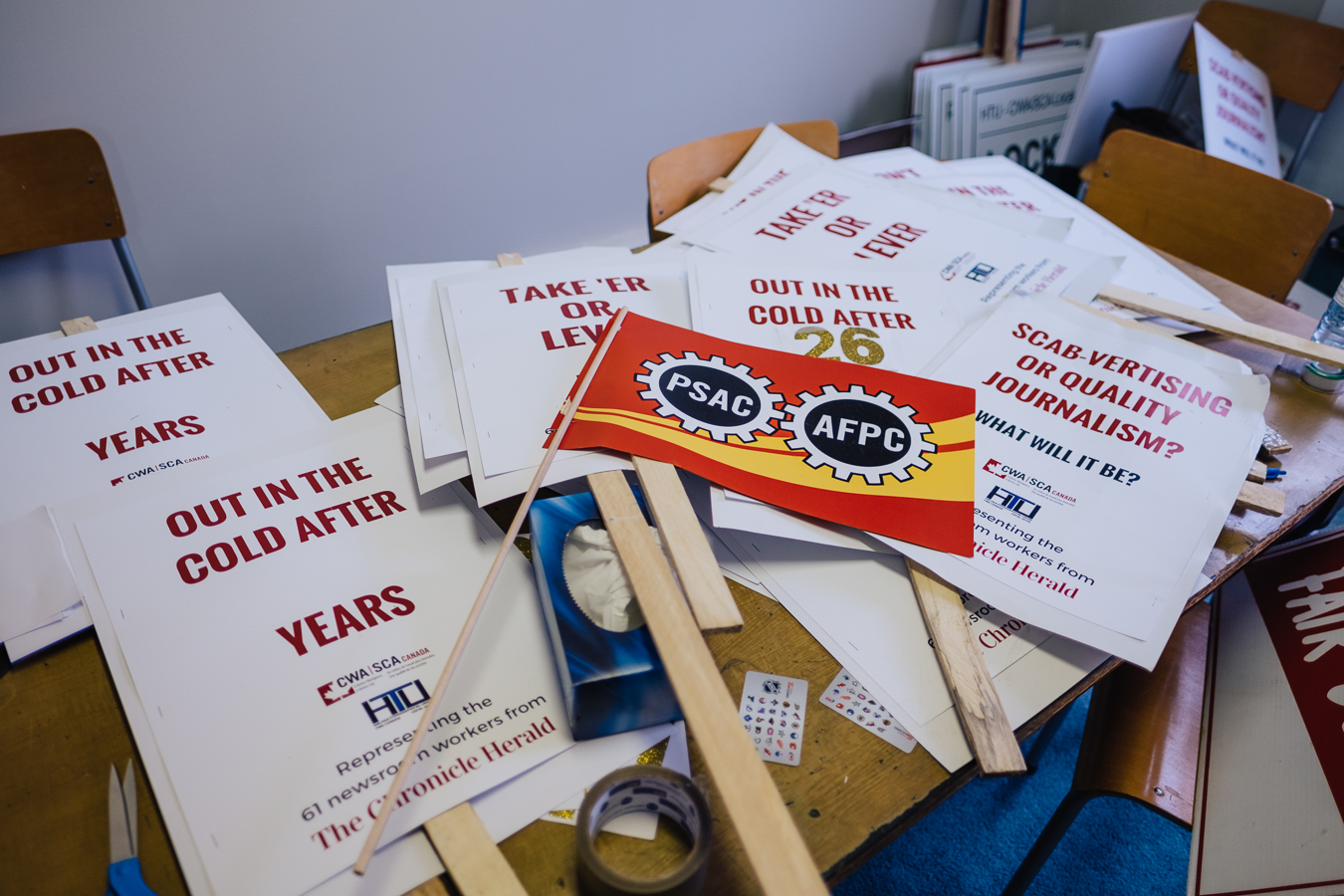News
Striking Herald workers using their own news site to get the stories out
Local Xpress showcases reporters' ongoing work

caption

caption
Striking herald workers block cars from exiting the Joseph Howe entrance of the Chronicle Herald building.Striking editorial workers at the Chronicle Herald launched their own news platform, the Local Xpress, on Saturday

caption
The Local Xpress home page (http://www.localxpress.ca). They also have a twitter account @xpress_local.Pam Sword, digital news editor at the Chronicle Herald who is on the picket line, said a lot of reporters never stopped working even after the strike was called. Related stories
Chronicle Herald employees enter second week on the picket line
“People were going out and doing stuff even before we had the website up… We needed a bucket to put everybody’s stuff in because people wanted to keep working,” she said.
Sword bought the domain and helped get the website up and running. She says there are three people running the website and contributors are submitting content and organizing via email, text and Dropbox.
“People are paying out of their own pocket right now to cover stories,” says Sword.
“We have bylines!”
On Jan. 12, before the strike was announced, the Chronicle Herald removed all bylines from their stories indefinitely. This came after unionized members had their own one-day byline strike as a form of protest.
Striking reporter Michael Gorman said, “That was one of the most frustrating things out of this whole experience…You’re the one grinding out there, doing the work.”
Gorman continued to cover the legislature via Twitter after the strike started, but he had no place to publish his work.
“I hated it. I’ve been blessed in what I do. I love working. I don’t celebrate hump day. I love what I do and not having an outlet for that was really frustrating,” he said.
He says with the Xpress he’s able to focus more on the unique stories that come out of legislature, rather than fitting them in between routine updates and reporting.
“We’re trying to get the stories that no one else has,” he added.
BYLINES! We have BYLINES! #CHstrike https://t.co/YOWCkcNAEj
— Local Xpress (@xpress_local) January 30, 2016
Freelancing isn’t out of the question for striking journalists either.
“You can’t sustain yourself on strike pay,” said Gorman.
For editors and photographers the first two weeks of strike pay is around $200 a week and grows thereafter.
Strike HQ
Striking employees represented by the Halifax Typographical Union picket at both entrances of the Chronicle Herald building. The Union has agreed they are allowed to block cars from leaving the Herald driveway for up to five minutes.

caption
Presentation-editor-on-strike Nadine Fownes uses a timer on her phone to count down exactly five minutes before letting the next car pass.Drivers honk in support as they pass the picket line on Joseph Howe Drive. Striking photographer Christian Laforce jokes that the strikers’ biggest fans are Halifax Water employees.
“I think they have the loudest horns,” he says.
Halifax Water employees had their own strike last spring. It started in May and lasted two months.
Laforce says, as a photographer who is usually working and filing from the field, one of the positive things about picketing is getting to spend time with co-workers.
“You lose track of how much you actually like a lot of these people,” he says.

caption
Sports Reporter Monty Mosher walks the picket line outside the Chronicle Herald building. He’s worked at the Chronicle Herald for 32 years.
caption
Ted Pritchard takes photos as he walks the picket line to share on social media. A lot of the striking journalists have taken to Twitter and Instagram to connect with their audiences.A photo posted by Ted Pritchard (@tpritchard.photo) on
Across the street from the Herald building and up a narrow set of stairs the union has rented space at St. James Anglican Church. This is where people walking the picket line come to warm up during their four-hour shifts. There is donated fruit, coffee, cookies and a Keurig that Sword says they “liberated” from the Herald offices.
“We all chipped in and bought that when we were at the Herald so we took it with us,” she says.
There are also blankets, hand warmers, a pile of picket signs and a sign-in sheet.

caption
Nadine Fownes designed the white signs on wood sticks. She was one of the editors to receive a layoff notice on Saturday morning after the strike had been announced.Sword says they have new signs coming to advertise the Local Xpress.

caption
Cars wait for their five minutes to be up.“We think content is what people are interested in”
Sword says striking assignment editor Chris Lambie still acts as their assignment editor.
Their website is simple, but Sword said they’re not trying to replicate the Herald.
“We think content is what people are interested in. The photos and stories will speak for themselves… We’re doing the things we want to do that we think are important. The things we think readers will be interested in,” she said.
Sword is also busy, saying a typical day involves 12 hours of juggling family commitments, replying to emails, updating social media and managing the Xpress website.
A topic that comes up often amongst the striking employees is how hard it is on their families.
“I want to go back there to have a break,” Sword said of returning to the Herald. “And get paid.”
About the author
Mel Hattie
Mel Hattie is a travel journalist from Canada's east coast. She's currently in the MJ New Ventures stream at the University of King's College....

P
Peter McIlveen
F
Frances Buott